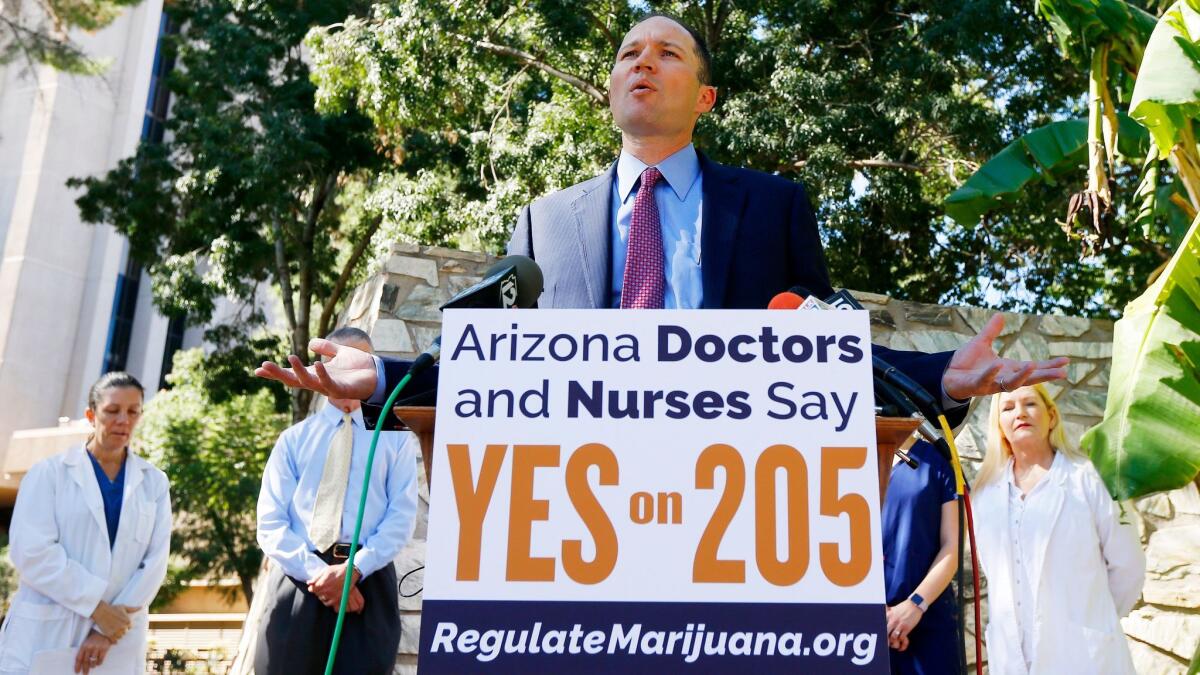After the election, marijuana could be legal for recreational or medical use in 29 states

- Share via
Reporting from Denver — Marijuana could be legal for medical or recreational use in 29 U.S. states after the November election.
The issue will be put to voters in nine states, with legalization backers enjoying well-funded campaigns and polls showing a high likelihood that they will prevail in the most populous states.
For the record:
4:50 p.m. Oct. 29, 2016A previous version of this article misspelled the name of Atty. Gen. Maura Healey.
Currently, marijuana is allowed for medical use in 26 states. Florida, Arkansas and North Dakota could join their ranks. Montana voters are deciding whether to loosen its current regulations on medical marijuana.
In addition, California, Arizona, Nevada, Massachusetts and Maine — all of which already allow medical use — could join Oregon, Colorado, Washington and Alaska as states that also permit recreational use. Those nine states account for nearly a quarter of the U.S. population.
The trend of states loosening restrictions is likely to put more pressure on the federal government to lift its ban on the drug. Americans overwhelmingly support medical marijuana use. The proportion backing full legalization has climbed from 12% in 1969 to 25% in 1995 to 60% today, according to Gallup polls.
At the same time, the state campaigns have shown that even some proponents of loosening the laws believe that some of the initiatives give too much power to companies seeking to turn the marijuana business into a nationwide mass market.
While polls in California show strong support for Proposition 64, the Adult Use of Marijuana Act, some pro-marijuana groups have come out against it, arguing that it favors big growers over smaller ones.
“For those of us who care about medical marijuana patient rights, Prop 64 is a horrible policy,” Dennis Peron, a hero of the legalization movement said in a statement. “The multimillion-dollar pro-64 interests represent Silicon Valley and others who wish to cash in on marijuana legalization.”
California is already the largest marijuana market in the country, having legalized pot for medical use in 1996 and done little to restrict its availability or what medical issues qualify somebody to buy it.
Still, given the massiveness of the state’s economy, experts said that formal legalization for recreational use could embolden lobbying efforts at the federal level aimed at making it easier for marijuana companies to do business. Current law makes it difficult for them to open bank accounts and illegal to ship across state lines.
“There are a whole host of smaller-scale reforms before full-on legalization that the industry would be thrilled” to work on, said John Hudak, a senior fellow at the Brookings Institution who studies federal marijuana policy.
Such reforms are increasingly looking inevitable.
Consider Nevada, where the legalization measure, Question 2, faces formidable opposition from the state’s powerful gambling industry. Sheldon Adelson, the chief executive of Las Vegas Sands, has contributed millions of dollars to fight the initiative there as well as the ones in Florida and Massachusetts.
The state’s largest newspaper, the Las Vegas Review-Journal, reversed its stand on the issue last year to oppose legalization, after Adelson bought it for $140 million.
Despite all that, polls suggest the measure will pass, and that soon tourists there will be allowed to toke up.
The Massachusetts initiative, known as Question 4, is also expected to pass, despite opposition from Gov. Charlie Baker, a Republican, and Atty. Gen. Maura Healey and Boston Mayor Marty Walsh, both Democrats.
“I’m not sure exactly sure what the benefits of creating a marijuana industry here in Massachusetts are,” Walsh said in a video advertisement against the measure.
The marijuana industry is also closely watching Florida, where a legalization victory would create the largest market for medical weed on the East Coast. Proponents estimate that about 2,000 dispensaries would be needed to handle the demand.
As a constitutional amendment, the measure requires 60% of the vote to pass. A similar proposal in 2014 fell just shy of that with 57%. Polls suggest it will pass this time.
The issue may be largely generational. Older Floridians “see marijuana the same as heroin, they just hear ‘drugs,’” said John Morgan, a personal injury lawyer and leading medical marijuana supporter. “The older someone is, the harder it is to get them to vote for my proposition.”
The presence of legalization measures on the ballot in Arkansas and North Dakota — both staunchly conservative states — illustrate the power of the trend toward legalization.
At the same time, opponents are still far from giving up. “Election day is the beginning of the battle, not the end,” said Kevin Sabet, a legalization opponent and head of the Washington-based group Smart Approaches to Marijuana.
Alex Halperin is a special correspondent.
ALSO
Making wine with biodynamically farmed grapes — and marijuana
The push to legalize pot for all has deeply divided the medical marijuana community
Editorial: Figuring out California’s 17 ballot propositions: Here are the L.A. Times’ endorsements
More to Read
Get the L.A. Times Politics newsletter
Deeply reported insights into legislation, politics and policy from Sacramento, Washington and beyond. In your inbox twice per week.
You may occasionally receive promotional content from the Los Angeles Times.







